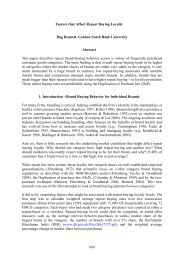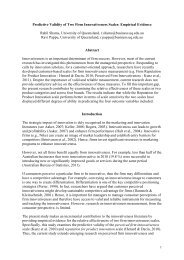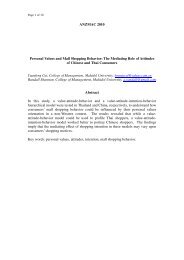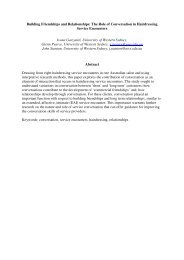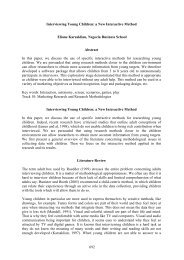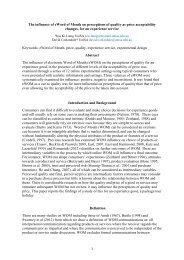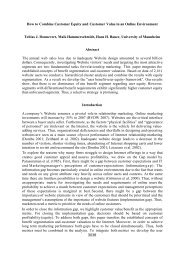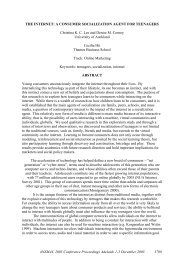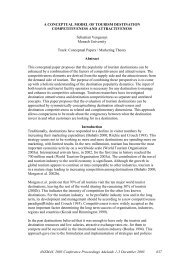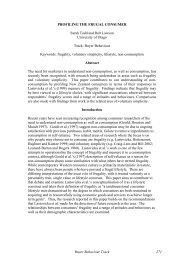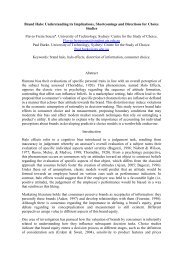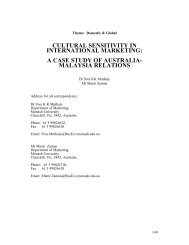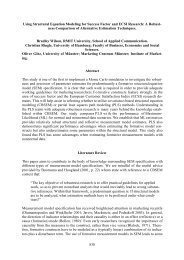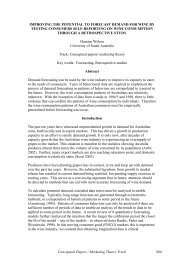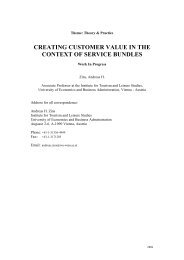amj Australasian Marketing Journal - ANZMAC
amj Australasian Marketing Journal - ANZMAC
amj Australasian Marketing Journal - ANZMAC
You also want an ePaper? Increase the reach of your titles
YUMPU automatically turns print PDFs into web optimized ePapers that Google loves.
and practical need by integrating the political economy framework<br />
with relational exchange theory. It widens the scope<br />
from economic and legal issues, to social, structural and<br />
cultural issues that are often the make or break of IJVs.<br />
A number of implications are suggested. Firstly, by focusing<br />
on the interaction between the internal economy and the internal<br />
polity, we have demonstrated that the form of governance<br />
of an IJV relationship will influence the nature of the relationship<br />
between the partners. Recognising the different<br />
requirements of different types of relationships may result in<br />
more successful IJV relationships. Secondly, by focusing on<br />
the dyad, the framework encourages managerial recognition<br />
of the partnership rather than the single firm. This highlights<br />
issues such as cooperation, joint decision-making and mutual<br />
(vs. one-sided) benefits. Thirdly, the importance of relationship<br />
maintenance variables has been highlighted through the<br />
introduction of relational exchange theory, suggesting that<br />
this should be a focus of IJV relationship formation and maintenance,<br />
in addition to issues such as contract negotiation and<br />
economic cost/benefit analysis. Finally, the discussion has<br />
recognised that the role of cultural sensitivity, a managerial<br />
concern in IJVs, is related to the governance form in an IJV<br />
relationship.<br />
Importantly, the framework provides managers with guidance<br />
on the how questions as well as the what questions. That is,<br />
by including day-to-day management issues relating to decision-making,<br />
the development of trust, communication, social<br />
bonds and the relative importance of cultural sensitivity,<br />
managers are not only alerted to what issues they should be<br />
focusing on, but how each of these issues should be dealt with<br />
under different circumstances. In doing so, the framework<br />
presented here views an IJV as a social entity in addition to an<br />
economic and legal entity. The management of an IJV therefore<br />
needs to explicitly incorporate social phenomena rather<br />
than leave it to chance. The view that business is a social<br />
activity with economic outcomes (e.g. Ambler and Styles<br />
2000) is increasingly gaining acceptance. Both theory and<br />
practice would benefit by exploring these issues further to<br />
ensure a good match on paper does not fail, or fail to fully<br />
exploit market opportunities, because of sub-optimal social<br />
behaviour and structures.<br />
The framework also highlights the need to place greater<br />
emphasis on the selection and management of the people<br />
involved in IJVs. Spekman, Isabella, MacAvoy and Forbes III<br />
(1996) attribute the causes of partnership failures to an insufficient<br />
focus and understanding of the partnership management.<br />
They advocate the importance of the partnership<br />
manager and his/her central role in the success of that partnership.<br />
They also argue that the partnership manager (such as<br />
the strategic alliance manager) takes a successive number of<br />
roles throughout the development process of the partnership<br />
(e.g. advocate, networker, or mediator) and the success of the<br />
partnership depends on his/her performance within these<br />
International Joint Ventures<br />
roles. A key underlying characteristic among those roles is the<br />
manager s ability to communicate effectively and instill trust<br />
in their partners (Phan, Styles and Patterson, 2000). Duncan<br />
and Moriarty (1998) argue that effective communication (and<br />
specifically information exchange between partners) is the<br />
tie that binds any relationship . Thus, managers for IJV<br />
assignments need to be screened for these social skills as<br />
much as technical and marketing skills, for example.<br />
The framework also suggests the need for regular measurement<br />
and feedback of the social workings of the IJV. The<br />
concept of a regular partnership audit is therefore relevant. As<br />
is often done with long-term supplier relationships (e.g.<br />
advertising agency/client relationships), an annual audit of the<br />
IJV relationship (vs. just its economic performance) would<br />
highlight those behaviours and social structures that are<br />
contributing to success as well as highlight areas where<br />
improvements could be made. In fact, the process of the audit<br />
itself (like is often the case with planning) may be the key to<br />
developing greater understanding between partners and lead<br />
to structural and process improvements.<br />
The integration of relational exchange theory and the development<br />
of the political economy framework of IJVs have<br />
suggested some future avenues of research. Firstly, the propositions<br />
that were derived from the framework should be<br />
explored empirically, ideally across different cultural settings<br />
i.e., amongst IJVs involving firms from different countries. In<br />
addition, the relationship maintenance variables suggested in<br />
the model should be further conceptually and empirically<br />
developed within the context of IJVs. Future research should<br />
determine whether these variables are conceptually different<br />
from those in other interfirm partnerships and if there are<br />
additional variables specific to IJVs. Future empirical<br />
research should: 1) be dyadic to account for both perspectives<br />
of the partnership (Li and Shenkar, 1997; Lin, Yu and Seetoo,<br />
1997) and; 2) involve methodologies appropriate for generating<br />
data on soft variables, such as qualitative case studies<br />
(Parkhe, 1993). Research should then be widened to include a<br />
range of different alliance forms, such as non-equity alliances,<br />
licensing arrangements and franchising, to name a few.<br />
Further, this paper has only considered the internal economy<br />
of IJVs. A future area of research is the external environment<br />
of IJVs and its interaction with the internal political economy<br />
of IJVs. Finally, the introduction of relational exchange theory<br />
suggests that future research should consider the process of<br />
IJV relationship formation and maintenance.<br />
6. Implications<br />
In the past, business practitioners and public policy makers<br />
have focused on the legal and economic aspects of international<br />
joint ventures. However, the view that business is a<br />
social activity with economic outcomes (e.g. Ambler and<br />
Styles 2000) is increasingly gaining acceptance. The introduction<br />
of relational exchange theory and the application of<br />
<strong>Australasian</strong> <strong>Marketing</strong> <strong>Journal</strong> 9 (1), 2001 27



